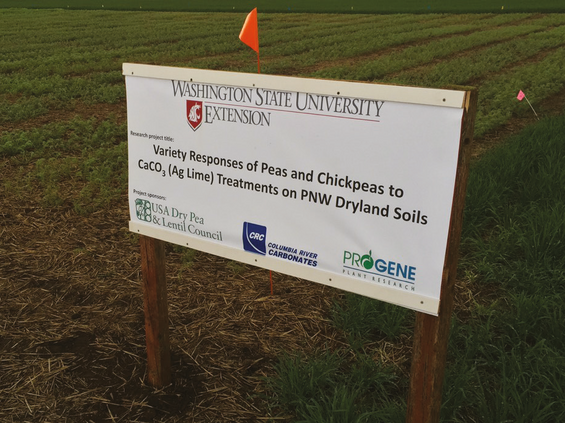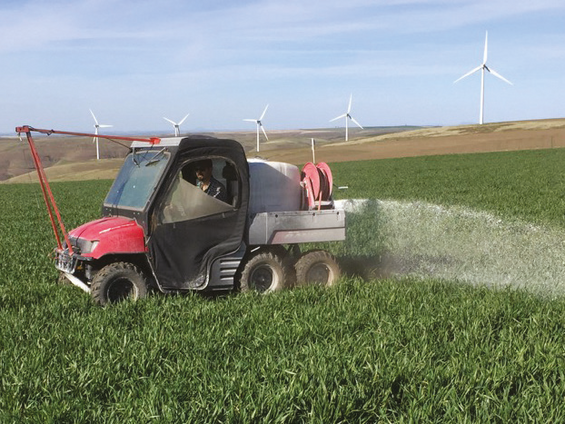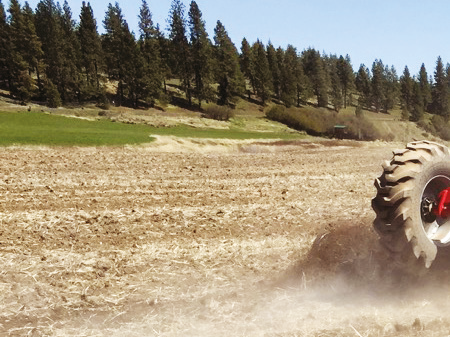Acid Influx

Farming the steep slopes of the Palouse region in the northwestern U.S. poses many challenges, but it's often worth the reward. That's because area producers have been blessed with some of the most naturally balanced and productive soils in the world. When pioneers first started farming the land many years ago, pH levels were near 7, which is all but perfect for growing most crops. Today, however, the picture is beginning to look a little less perfect.
In 2013, a soil survey representing 18,000 acres in Columbia County, Washington, discovered extremely acidic pH levels ranging from 4.2 to 5.4 in the 3- to 6-inch root zone. The majority of samples tested less than 5. Considering that wheat, for example, can only achieve about 78 percent of its full yield potential at 5 pH and 68 percent of its yield potential at 4.7 pH, farmers were beginning to watch income erode along with their soil conditions.
Obviously, these acidic soils are a far cry from the neutral pH they once were, but this change didn't happen overnight. Instead, over the past 50 years, the increasing use of ammonium nitrogen fertilizer to raise high-yielding crops has helped lead to lower pH levels in these particular soils. When ammonium nitrogen (NH4 or NH3) is applied, the soil bacteria converts it to nitrate nitrogen (NO3), a form that is readily available to the plant. In the process, hydrogen is released, and the hydrogen increases the acidity of the soil.
Most producers from other areas of the world would use large applications of limestone to fix this problem on their own farms, but the answer isn't so easy in the Palouse. The people here simply lack the experience to do it. Additionally, it's very difficult logistically for area farmers to get their hands on lime, since the region in the past lacked distribution. After all, ag lime wasn't needed in the Palouse until just recently.
Columbia River Carbonates is trying to change all that with the help of their representative Gary Wegner. Gary used his background in animal and soil nutrition to correct the pH problems on his family's 100-year-old farm near Reardan, Washington. He works with Columbia River Carbonates to bring the company's micronized ag lime products to the Palouse.
"In 1991, I worked with the University of Idaho to conduct five-acre grid sampling on my farm, and we came up with pH levels ranging from 4.3 to 8.3," said Wegner. "After amending the pH levels, we were eventually able to turn 15-bushel wheat yields on some of the most acidic ground into 85-bushel yields. Years later, I realized nobody else in the area was doing anything to correct their pH, so I wanted to bring a product to market that would help them, too."
The new product, called NuCal,™ is a liquid solution that contains 12 pounds of calcium carbonate, or 4.8 pounds of pure calcium, per gallon. Unlike regular ag lime, the calcium carbonate is ultra-micronized with particle sizes of only 1 micron. In comparison, 100-mesh lime is 149 microns, and 200-mesh lime is 74 microns. The smaller particle size allows the product to work much more quickly and effectively. "Pound for pound, NuCal is close to five times as efficient as regular ag lime," said Wegner.
To apply the liquid, farmers can use pull-behind or self-propelled sprayers with customized booms, consisting of several large nozzles to broadcast the solution directly onto the soil. For instance, a sprayer with 100-foot booms can be outfitted with a new boom system and four nozzles to provide a 96-foot spray width. The system utilizes the existing sprayer pump, but standard booms and nozzles aren't used for the application so that the tiny calcium carbonate particles don't damage the valves, electronics or other OEM equipment.
After the calcium carbonate is applied, Wegner finds that the product may move several inches through the soil in the first year, mostly from the help of rain in no-till operations. However, he believes that working the product into the soil may provide the quickest response. As a result, the HORSCH Joker has become a tool of choice for incorporating NuCal.
Unlike conventional disks, the Joker is able to consistently mix the calcium carbonate in just the top several inches of soil, where pH has been most affected by ammonium nitrogen placement. That's because it has a precisely controlled working depth of 1 to 5 inches and aggressively angled blades designed for optimum A Joker is used for precise incorporation of calcium carbonate into the root zone. soil engagement. The Joker's RollFlex finishing system is also ideal for consolidating the soil/calcium mixture into a smooth, dense seedbed for planting. Having the calcium carbonate incorporated into the seedbed provides immediate benefits to the next crop. "The closer the calcium is to the seed, the better," said Wegner. "New seedlings need the calcium."
Instead of spraying NuCal onto the soil, a grain drill can also be used for placing the liquid directly into the soil with the seed. "Precision placement of the NuCal with the seed is very desirable," said Wegner. "We're currently working with Washington State University and Central Washington Grain Growers to explore this concept."
For this type of application, the HORSCH Cougar appears to be an ideal option. Its low center of gravity and steering axles are specially designed for maintaining stability on extreme slopes like those in the Palouse. Plus, its large liquid capacity cart can be adapted for calcium carbonate.
By using a drill like the Cougar to precisely place calcium carbonate with the seed, farmers may also be able to use less product while achieving more short-term gain. This concept is more about feeding the plant than feeding the soil. "Putting on lower rates of calcium carbonate with the seed will not correct the overall soil's pH," said Wegner. "But by placing it in the seed zone exactly where the seed needs it, farmers are likely to see as good or better yield response in that given year. Beyond pH, the nutritional benefits of calcium in the soil solution are significant."
Although the program is still in its infancy, Wegner knows that farmers who have tried using the calcium carbonate solution are making great strides in fixing their soils. "One farmer, who has been with us since we introduced the product in 2013, saw very significant results the first year," said Wegner. "This year, the region struggled with drought and winter kill issues, but his crops showed much more resilience to winter kill and heat stress than his neighbors."



